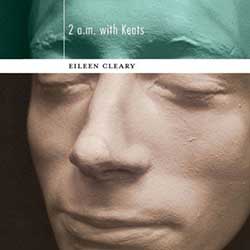 *
*
Review by Off the Shelf Correspondent Denise Provost
US Poet Laureate Joy Harjo has said that “grief is a lifelong lesson.” Poet Eileen Cleary, in her arresting collection 2 a.m. with Keats, writes of her own lessons in grief to notable effect. With lush imagery and restrained but powerful incantation, Cleary pays tribute to her friend and teacher, the late Lucie Brock-Broido, to whom this volume is dedicated, as well as to John Keats, who is explicitly invoked.

2 a.m. with Keats, by Eileen Cleary
Nixes Mate Books, 48 pages, $15.00
In the poem Moon Goddess Takes Leave of the Sky, Cleary declaims:
“Before legends, before
Luna became Lucia. Lucia winds her grandfather clock.
Speaks Come hither in time with the fire.
Kindling thoughts,
She implores
Tell me.”
Cleary proceeds to tell us a great deal, in the entire central chapter, about her 2 a.m. Keats Visitations in that “[h]our of winged and spectral images….”
It not unheard of for readers to form intense identifications with the poets they most often read and admire; Keats did so himself. Poets are perhaps especially susceptible to experiencing the writings of another poet as a kind of communion, and to finding affinities with them. It is, however, remarkable to find a written record of such intimate musings as these.
This holistic collation of poetry constitutes more than an homage to Keats. In it, Cleary speaks directly to him. She addresses Keats as a fellow orphan (“Your mother left you? /If you were mine, I’d name you/star and I’d be astrophile”), fellow mender of those in broken health (“Caring for the dying/is holy, John/a gift they can’t return”) and as soul mate (“I’m not your first/platonic lover/You’re not mine.”)
Poet Patrick Donnelly is among those who praises 2 a.m. with Keats, describing its “startlingly fresh and tender” lines as being “strange in the most necessary way.” Donnelly goes on to say that “strange” is “the highest compliment I could give any work of art.” These aesthetics of the “strange” bring to mind Charles Simic’s description of a successful poem as one which possesses “originality,” which he explains as a creation which is “without precedent, it doesn’t fit preconceived notions” – by that measure, this book is one which is clearly original.
2 a.m. with Keats deserves thoughtful appreciation of its singular features. A careful reader will find within its pages’ sly rhymes; odd echoes of some of the more off-kilter rhythms of, say, Keats’ Endymion. It also harbors allusions aplenty: “My condolences on your silver dove….” “Don’t say the father died; say night falls/as if a father off a horse….” “You’ve become allusion.”
Beyond all else, this is a book which deserves credit for its emotional courage – how many of us would dare to go so far in exposing our attachments? This volume pushes literary – and personal – boundaries in a way that challenges our consideration. It will be much talked about; prepare to join the discussion.















Reader Comments